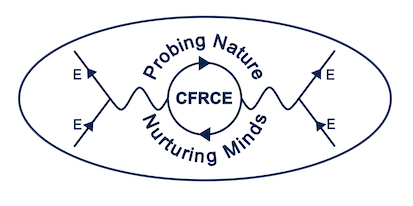Ankith P: From "Lazy" to Phenomenal Right-Brain Learner
"He does not study at all. At home he troubles his younger sister all the time. At school, his teachers complain that he is lazy."
Ankith's mother was anxious that he would not be able to cope up with his studies if he continued like that. She had brought him to the Centre to find out if something could be done. Ankith, however, suspected exactly that and was getting ready to make for the door. But the Director's smile made him hesitate. He lingered a bit, looking around the office.
"Would you like to read some comics?" The Director said continuing to smile reassuringly.
"Sir, that is his problem. He always reads comics, hardly touches his books." His mother commented.
"That is quite natural. At his age he should be reading comics and storybooks. That is more important for his mental development than school books." The Director replied. Ankith's mother appeared shocked to hear that. Perhaps she felt that would only encourage Ankith's "laziness". Ankith's face bore a faint smile. He relaxed a bit, feeling comforted. It was obvious he found it strange that someone was appreciating him for the very first time. Perhaps the Director was eccentric. A moment later, he seemed to tense a bit. Who knows, the Director could be playing a trick. He was praising him so that afterwards he could be trapped into some kind of tuitions. Again Ankith made a move towards the door. Noticing his restlessness, the Director prompted, "you can go and read some comics. They are there on that shelf in the other room." Ankith now appeared to be completely relaxed. The Director's voice carried sincerity. He was not playing a trick, Ankith thought. Ankith's mother looked on completely baffled. This was something she had not expected. Instead of talking about studies, the Director was indulging in her son's idiosyncrasies. It appeared to be her turn to prepare to leave. But Ankith, however, seemed intent on staying for a while longer.
"Ankith'e eyes reveal a rare intelligence," the Director spoke, having appraised Ankit. "I am sure he has an artistic intelligence that has not perhaps been fully cultivated."
"Yes, sir..." Ankith's mother beamed. "He has actually participated in several competitions. He has won prizes...but in studies..."
"Oh, that does not matter. He can always draw on the right side of the brain and master his studies."
"What do you mean, sir?" Ankith's mother was curious.
"I am referring to Ankith's artistic intelligence. As to the phrase, I meant by it the book by Betty Edwards, "Drawing on the Right Side of the Brain." The capabilities of the right brain are yet to be understood by the conventional educational system. It caters mostly to the left brain faculties. By tapping the right brain it is possible to achieve extraordinary results as Ankith will soon be demonstrating. His habit of reading comics will lead him to outstanding achievement, and it will not be surprising if he may make it to a great career in that very field."
Both Ankith and his mother were now listening intently.
"Would you like to read more comics, on a more regular basis?" The Director asked Ankith. Ankith nodded eagerly.
"What else do you like?" The Director asked.
"Wildlife!" Ankith shouted out happily. He could not believe that he had become the star of the discussion, this time in a positive manner.
"That's great. India needs you. It's great natural heritage requires people like you. Would you like to do something in wildlife? Not later but right away?"
Ankith's eyes opened wide. He looked at his mother. Surely he was dreaming and his mother wold soon wake him up. But no...it looked real. It was real. He ventured, "Yes, can I do something in wildlife?"
Ankith's mother had all but given up. The discussion had alrrady gone out of hand and she could do little about it. Now there would be no way to get her son into his studies. He was going to be even more offtrack than before. Noticing that, the Director smiled. "Ankith, would you like to read some comics on wildlife? I am not sure, but I think there are some. Why don't you look them up. If you don't find them we will get them for you the next time."
Ankith bounded off to the other room. The Director looked at Ankith's mother reassuringly and said. "Ankith, as I observed, is a remarkably intelligent boy. He is meant for great things in life. He has a passion for comics and for wildlife. That passion will take him to great heights. All he needs is to become deeply aware of his major purpose in life. Purpose, is not something that is often there. It needs to be awakened or to be built. In Ankith, the sense of purpose is already awake. He has just not known how to align his passion along the direction indicated by his purpose. Once he does that, no one can stop him from achieving outstanding success, not only in his passion for comics and wildlife but also in his academics."
"But...sir...how does indulging in comics and wildlife lead him to success in academics? Success does not come without hardwork."
"Indulging in comics and wildlife by themselves may not lead him to success in academics. But indulging in comics and wildlife, as a step along a greater path that fulfils his passion certainly can, and that is what we are going to do soon. As to hardwork, mere hardwork, mere plain hardwork leads to little beyond itself. Do you know why?"
"Really, sir? Our parents taught us that hardwork is the way. How could they be wrong? It is traditional wisdom!"
"Certainly. It is no doubt traditional wisdom. Let me explain. But first I need to know which field to use to illustrate my explanation. Madam, if I may ask, what is your field of work? I am sorry, there was no occasion for me to ask you that before. Ankith took all our attention."
"Sir, I am a teacher. I teach physics at the degree level, I mean, for BSc. That is why I am so sceptical about your words. I have seen students become lazy when you encourage them to what what they want. They must be disciplined."
"Discipline, no doubt is absolutely necessary. Yes, Madam, you are right. And we could look into the nature of discipline a little. Anyway, as you are in the field of physics teaching, could I ask you something? Just to illustrate what we at CFRCE mean by discipline?"
"Of course, sir."
"Well, Madam, as you no doubt teach students, Aristotle was a great philosopher but not a great natural philosopher, am I right?"
"But...what do you mean natural philosopher..."
"I mean, Madam, that Aristotle was a genius in so many things. As Dante writes in his Divine Comedy, Inferno, of "Aristotle the Master of those who know"...but when it came to Nature, to physics, he was at flaw. He thought everything could be discovered by thinking alone, without reference to experiment..."
"Yes...yes..."
"So, according to Aristotle, nothing moves without force! I mean, he did not define force in the rigorous manner of Newton... but nevertheless...Nothing could move without force. Something in motion was so by virtue of being forced continuously."
"Yes sir...certainly..."
"Now, madam, what do you teach your students about that?"
"Oh...Aristotle was wrong about that...No doubt to make an object move from rest you need force. And after that...if there is no friction...it is not necessary to keep forcing it...it moves by its own nature."
"Yes, Madam...it moves by its own nature...provided there is no friction...and not only that...to bring it to rest you need force..."
"Yes sir...yes...that is right."
"But...Madam...an object once at rest is now in motion...what kind of motion is that which does not require a force to keep it in motion?"
"Well...sir...uniform motion."
"And...uniform motion is equivalent to rest..."
"Certainly...sir...that is Newton's first law."
"So...you only need to give it a sufficiently strong force in the beginning...I mean, sufficient to overcome the static friction due to inertia of rest...and then...it starts moving...and if you don't apply force to disturb it from its inertia of motion...it continues to move without any more force...And actually, seen from it's own frame of reference...it is at rest."
"Yes..sir...that is true."
"So, Madam...if you compare hardwork to force...it follows that you need hardwork to start something...but not necessarily to continue it...what appears to be hardwork could...in fact be effortless action..."
"Yes...sir...you are right...but..."
"And...Madam...Aristotle was the pinaccle of traditional wisdom...And he was wrong. And so...by his own traditional syllogism, it follows that traditional wisdom is wrong in this case...that...hardwork is necessary for success. It is necessary only as a step...but it is not sufficient...nor always necessary."
"Please explain that a little more...sir..."
"Madam, from this example we can draw certain conclusions...there are two kinds of hardwork. Hardwork that results in uniform action or flow and hardwork that results in non-uniform action or dissipative action. When hardwork results in flow or optimal experience, it continues to lead to growth and development. But hardwork that leads to dissipative action leads to wearing down and burnout."
"But how could traditional wosdom be so wrong sir.."
"Madam...first of all...it could be wrong...and there is no reason why it always has to be right. Afterall are we always right? So much right that our future generations will hold us to be wise in everything? Likewise, traditional wisdom need not always be right. They could be in so many things but they need not in so many other things. Moreover, more than they being right or wrong, it is our interpretation of their wisdom that could also be wrong. Looking back to the past, I have found that the truly great Masters have always known this secret, that mere hardwork is not the way to success. It is intelligent, purposeful work that is the key to success. And coming back to Ankith, he is going to engage in intelligent, purposeful work that will lead him to outstanding success."
"Sir...I grasp the situation...could you take Ankith into the mentoring program?"
"That depends on his purpose...he will have to state it. It is his self-drive that will lead him to his achievement."
Ankith wrote a brief statement of purpose and was soon enrolled in the Advanced Learner's mentoring program as he was found to be strongly motivated. Ankith discovered at CFRCE, an environment unlike anything he had encountered so far. He found his fellow students treating him with unconditional dignity and respect, someting he had never received at school. His mentors treated him like a gentleman and scholar and spoke with words full of respect and care. And it was genuine. Ankith's keen innocent mind could sense that the respect was spontaneous, natural and genuine. There was no wisp of training in the mentors. They were scientists steeped in learning and enthralled by it, enraptured by the joy of inquiry and the sharing of ideas. He realized that he could ask them anything, even the remotest and deepest questions and they would spontaneously and joyfully help him in discovering the answers. He also noticed something else that struck him as strange. They were not in the least hesitant to admit when they did not have an answer or know a topic. And they were always keen to find out more for themselves and completely open even to learn from him. After a while, Ankith felt a deep transformation coming over him. On the very first day, encouraged by his mentor he started out by reading comics and exploring books on wildlife. He soon realized that there were no comics on wildlife per se. Seeing his predicament, his mentor nudged him to create them for himself. Ankith armed himself with a pencil and sketch pens and began to create the comics he wanted. After a while, his mentor gently made him aware that his comics could possibly be read by others and they would pick up whatever facts Ankith had stated. So Ankith wanted the facts to be clear and accurate. He began to research out the facts for himself before putting them to paper. At the end of the first day's session, Ankith had produced three pages of comic material. Reading that was a treat to everyone at CFRCE. Ankith had produced an astonishing wealth of material in those three pages. He had named his series as "The Fossil Hunt."
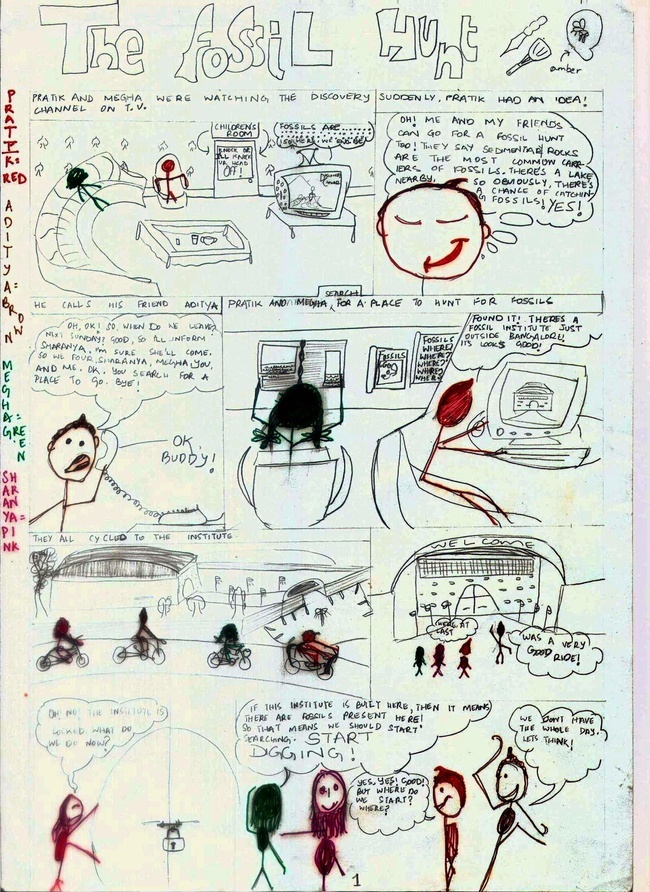
And he continued, week after week. He researched all the facts he was putting in his comics and made sure everything was well tied down. He ended this series with the following page.
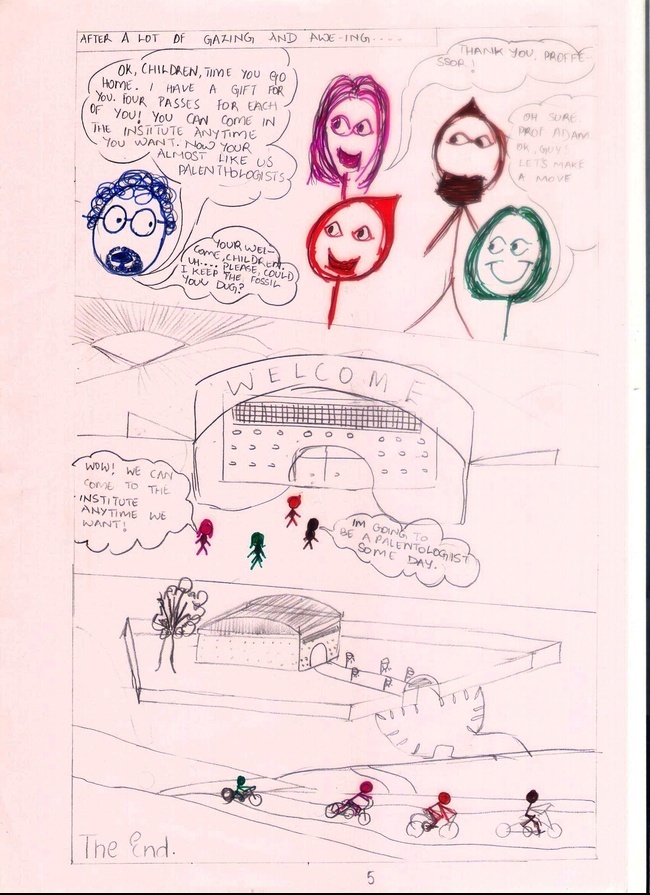
Next, he started out on another series he called the "Time Machine," the first of its pages was as follows.

Some of the most interesting pages were as follows.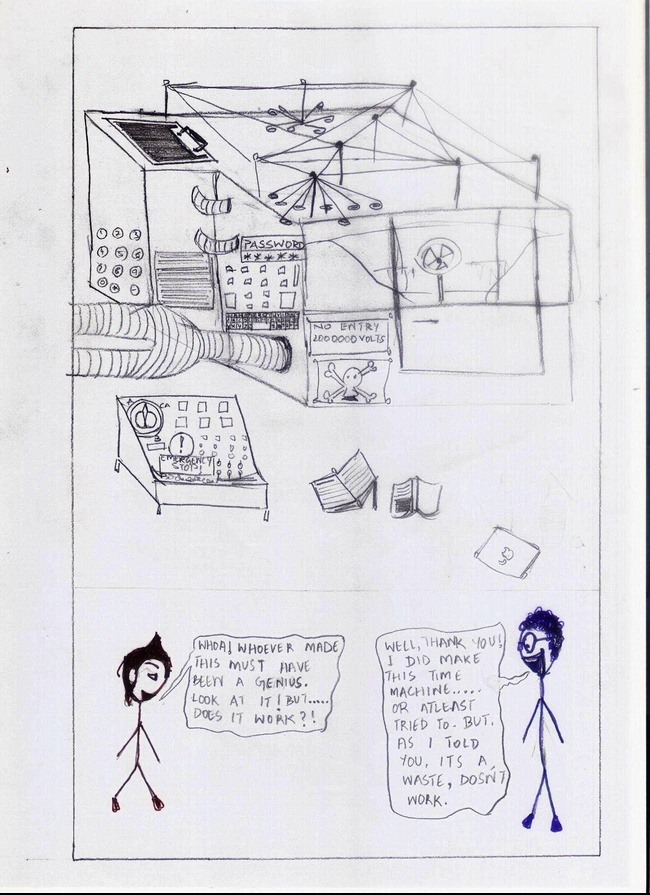


He ended this series with the following page.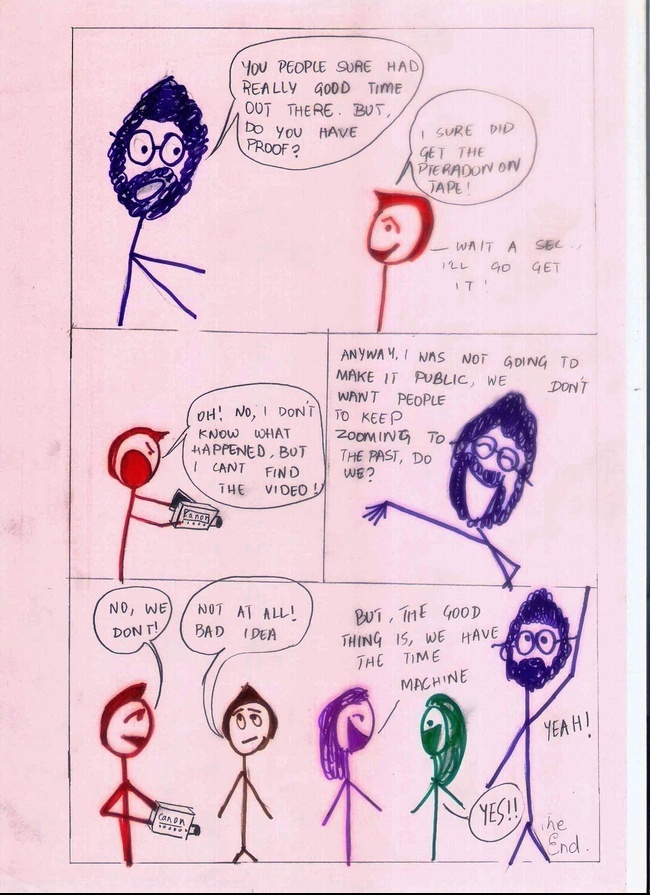
And Ankith went on and on to write pages after pages of comics, more precisely, - educational comics, -for they had now acquired a great value as educational materials, something that any student, even at the college level could read and learn from, containing biology, physics, chemistry, mathematics...packed into its pages.
A few months later, his mother had come with a different situation. Ankith was no longer restless. He was no longer troubling his sister. His teachers admired and appreciated him. His mathematics scores had shot up miraculously. He was calm and self-possessed at home. Even when his mother was anxious about something, Ankith was not. He counseled her to sit down calmly and think through the anxiety. What had happened? How had Ankith reached that level of maturity and development?
Before we answer that let us see what greater success was yet to come for Ankith. Spurred on by his new cognitive-conative-affective breakthrough, Ankith felt the stirrings of new challenge. He wanted to take his learning and creativity further and, if possible, map out his future path. He looked up and established connection with Gerry Martin, the famous naturalist. He wrote to him expressing his deep passion for wildlife. Gerry Martin replied with enthusiasm and invited Ankith to come over for a camp at his farmhouse. So Ankith took himself off to explore wildlife firsthand, hands-on. After he returned a week later, his fellow students at CFRCE were surprised to find that Ankith had brought a broken crocodile tooth that he had extracted and several other wildlife "trinkets" and "souvenirs." A little later there came a newspaper report exhibiting Ankith carrying a python on his shoulder.
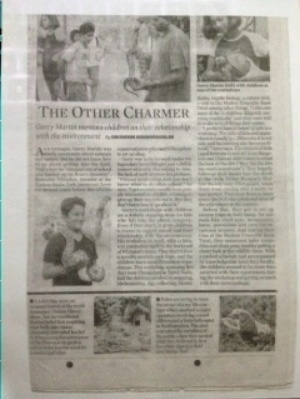
Now, returning to the question we asked in the previous paragraph, "How had Ankith reached that level of maturity and development?"
The answer lies in a profound finding only now becoming popular in Cognitive Neuroscience but in some way, known to the a few great Masters in the past, and independently rediscovered and developed further at CFRCE. The brain is a complex adaptive, active processing, spontaneously self-organizing system. It can best be set upon its self-organizing faculty by placing it in an environment conducive to its unfolding. And environment is much more than the physical surroundings. It has to do more with the intellectual, emotional, psychic levels than the merely physical. And it crucially depends on interaction with other brains already in the process of spontaneous self-organization. Self-organization leads to self-regulation, which, when nurtured wisely, -leads to self-actualization, - the utmost possible unfoldment of the deepest potential in the human being. The CFRCE method as practiced by its mentors does this to a profound degree.
The CFRCE mentoring had empowered Ankith to spontaneously self-organize his learning and set about actualizing his deepest potential.
